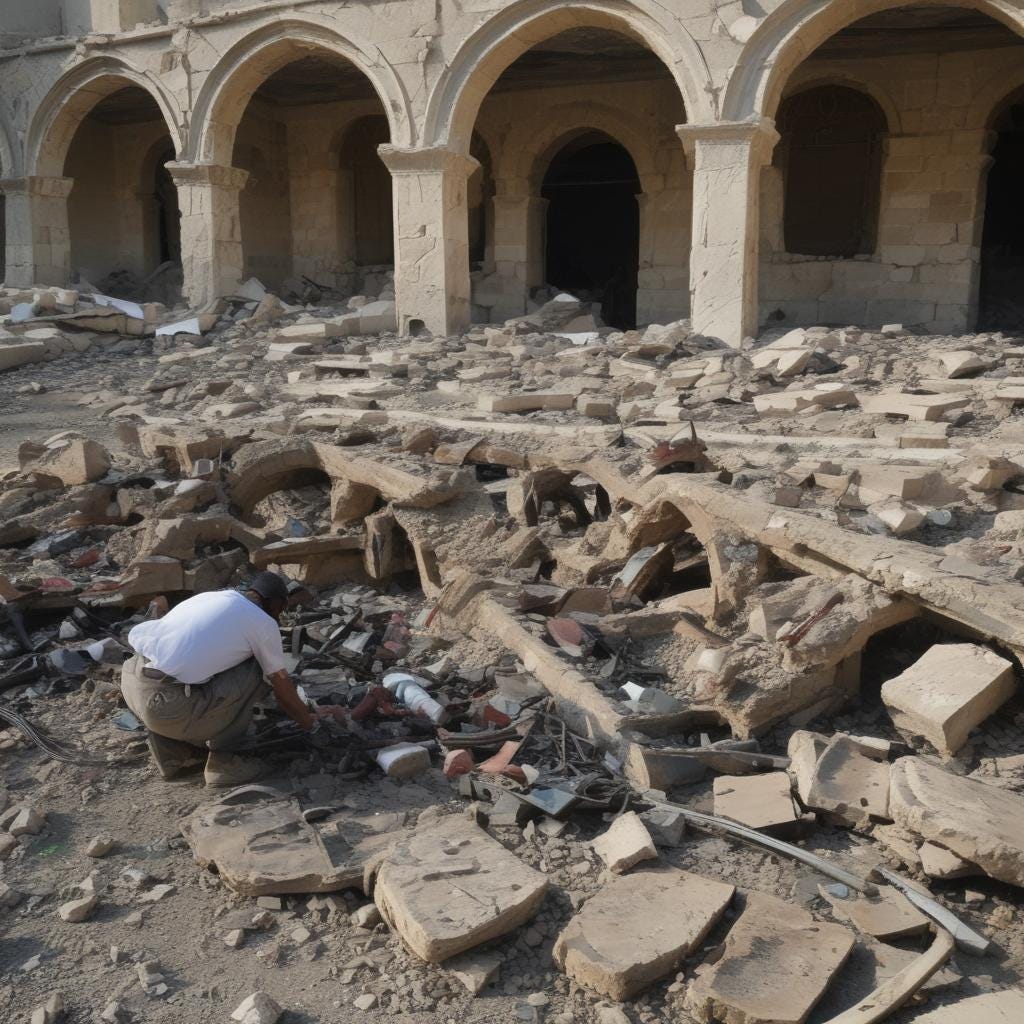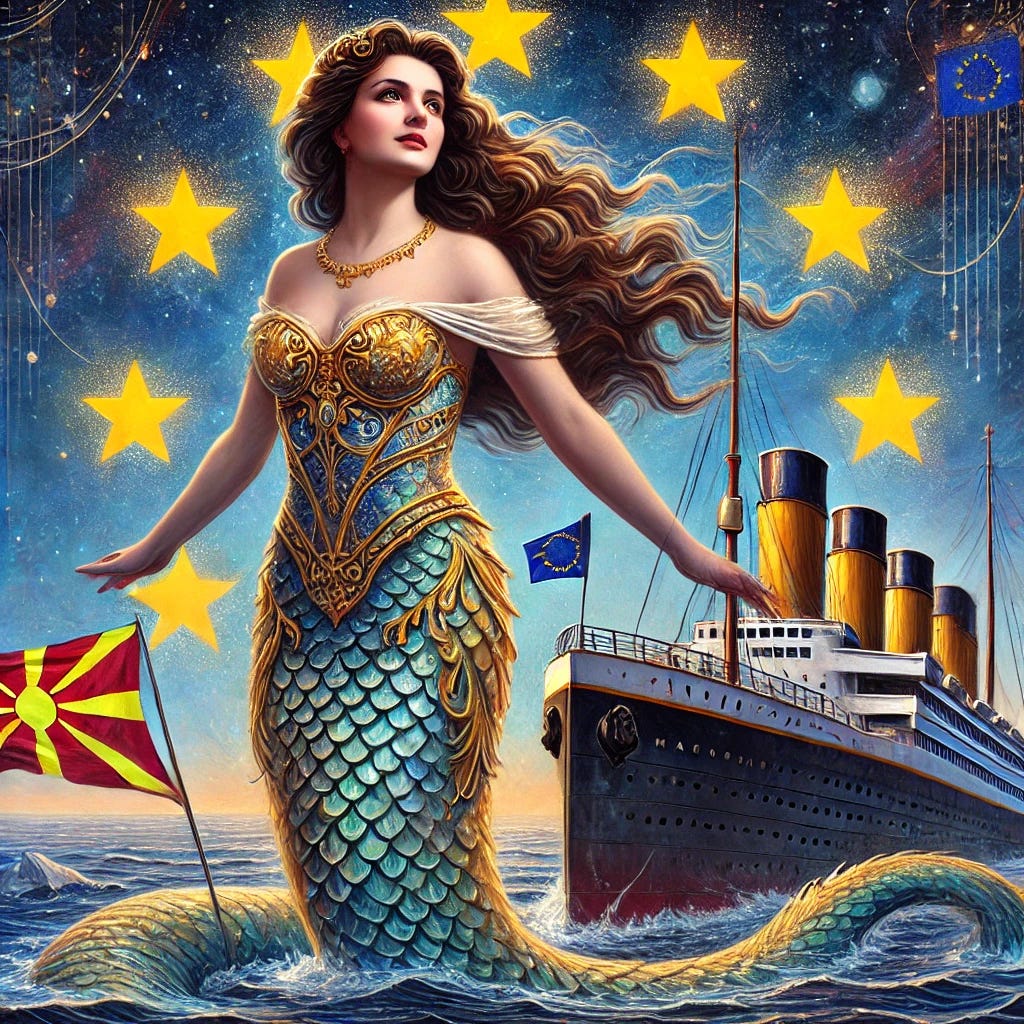This column is inspired by the statements of two individuals who could not be more different or further apart in every sense of the word (origin, position, ideological views, and power): the President of Macedonia and Vijay Prashad, a renowned Indian author and leftist activist. The former is like a priestess of the EU cult, while the latter is one of the most prominent humanists and Marxists.
I will start with the latter. I have been following him for years and admire his courage and energy in fighting against all the evils that plague us as humanity—issues that many either remain silent about or quietly partake in. A few months ago, when he invited me to join a global initiative called No to a New Cold War, I was genuinely honored. The core council consists of 15 people from all continents. We meet online every week to discuss dramatic global events and then attempt to articulate ideas for peace in a world gone astray. Each of us is, of course, individually active wherever we can. But what unites us is encapsulated in the following statement from a public declaration signed by hundreds of people worldwide:
" We note the increasingly aggressive statements and actions being taken by the US government in regard to China. These constitute a threat to world peace and are an obstacle to humanity successfully dealing with extremely serious common issues which confront it such as climate change, control of pandemics, racist discrimination and economic development.
We therefore believe that any New Cold War would run entirely counter to the interests of humanity. Instead we stand in favour of maximum global cooperation in order to tackle the enormous challenges we face as a species."
Of course, the events that emerge as urgent increasingly lead to engagements that diverge (at least seemingly) from the core idea and mission. For example, the dismemberment of Syria was the final drop of blood and despair that overflowed the cup, already spilling over from Gaza and Lebanon. Vijay is among those public intellectuals who are tireless during this greatest crisis of humanity, and I most often agree with every word he says. However, in his talks regarding Syria, he used the term "Balkanization" a few times, which made me jump out of my chair. Every mention of that term strikes a chord deep within me, in a way that is not only uncomfortable but even offensive. I told him as much, though we didn’t have time to debate the deeper reason. Later, I realized that many people (even those of Macedonian descent) have begun to casually use that word as the most appropriate way to describe the bloody dissolution of Syria (and the simultaneous redrawing of borders in the Middle East region).
That led me, in a way, to revisit the words of Maria Todorova in Imagining the Balkans:
“Balkanization” not only had come to denote the parcelization of large and viable political units but also had become a synonym for a reversion to the tribal, the backward, the primitive, the barbarian. In its latest hypostasis, particularly in American academe, it has been completely decontextualized and paradigmatically related to a variety of problems. That the Balkans have been described as the “other” of Europe does not need special proof. What has been emphasized about the Balkans is that its inhabitants do not care to conform to the standards of behavior devised as normative by and for the civilized world. As with any generalization, this one is based on reductionism, but the reductionism and stereotyping of the Balkans has been of such degree and intensity that the discourse merits and requires special analysis.”
In short, the Balkans serve (unfortunately, as we now hear, this remains true) as a repository for negative characteristics, against which the positive and self-congratulatory image of the "European" and "the West" is constructed.
The 'Balkanization' of Syria, much like that of the Balkans (following the dissolution of the great empires that ruled it for centuries), is neither the result nor the fault of its inhabitants but rather of external powers. Yet, we know all too well by now that we, the 'locals,' are blamed for every failure to transform us into decent and civilized (!?) people/nations, while the 'Western missionaries' always arrive with a civilizing mission. Now they are 'civilizing' fragmented Syria by posing for pictures and shaking hands with a man once an ISIS jihadist and head chopper —dressed in a Western suit, with his beard trimmed and his Wikipedia biography conveniently sanitized.
This is precisely what even our friends from the Global South fail to understand when they unwittingly use a term coined by and for the West, a term that continues to hang over us, demonizing us to this day.
Our local 'pro-Western priests' are practically ready to hand us whips so we can flagellate ourselves every time the EU disapproves of our right to simply be Balkan people (or, God forbid, Macedonians in that context). These stereotypes persist across the entire region, even in Greece—a country that has long been part of NATO and the EU. For instance, in the popular Greek TV series Maestro, you’ll occasionally hear the main characters (from various social backgrounds) say, when referring to the EU, 'this is our chance to become Europeans.' The storyline spans from the 2015 crisis to the present.
The problem is that this deeply ingrained inferiority complex has made us unwilling to embrace who we are and who we ought to be. Instead, we yearn to 'marry' the EU (and this analogy isn’t limited to Zaev but applies to the entire political 'elite'). We want to become not-Balkan, but something 'better' than that. Naturally, in this EU euphoria, everyone turns a blind eye to the dark spots in colonial Europe's history—its wealth, beautiful architecture, economic and political power—all built on centuries of colonization, genocide, and exploitation of those weaker than them.
It remains unclear where such blindness comes from, which in this case can be described as 'night blindness' – because night has fallen over Europe, but everyone pretends that they are warmed by the sun of 'European values.'
Today's EU stumbles, with governments falling like dominoes or with characters from the far-right emerging as winners and contenders (look at Austria, the country that coined the term 'Western Balkans,' which is a double stereotype and insult for all of us in this special cage for uncivilized Balkans). Or should we talk about the annulment of presidential elections in Romania (an idea proposed by a former EU commissioner for Germany if 'their' side doesn’t win). The fairy tale of the EU ends as a dystopia, but for the hypnotized Balkan (supposedly proud) leaders, this is a process they either don’t see or don’t want to see. With or without Trump, the EU is sleepwalking towards its own collapse. Or should I say, towards 'Balkanization.'
What can we hope for in 2025? First and foremost, we must free ourselves from the complexes embedded in us like an invisible chip, which lead both the young and the old to dream of becoming something other than our authentic selves. We need to rid ourselves of the shame of being part of a region that has endured horrific periods, much of which are the responsibility of Europe, the US, and the West—not solely our own. Should I remind you that the CIA once had plans for the "Balkanization" of the SFRY and the USSR, and now its focus is not only on the Middle East but also on China (with increasingly unsubtle claims of genocide in Xinjiang, while the Uighurs are already leading the charge in the destruction of Syrian society)?
Imperialism is knocking at our door, but that is a discussion for another time. For now, I will ask Vijay to reconsider before mentioning "Balkanization," and perhaps the Macedonian president will stop playing the role of the European siren, since the ship was already called the Titanic long before she began writing academic papers. We may not have many things to be proud of, but we cannot allow their guilt and stereotypes to be embedded in our minds as though they are unassailable truths, rather than the colonial narrative designed to discipline the subject.









